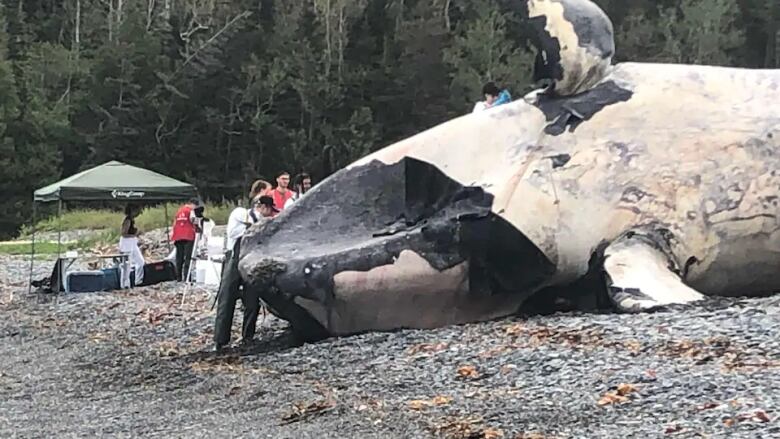More needs to be done to identify travel paths of North Atlantic right whales, scientist says
8 North Atlantic right whales have been found dead in the Gulf of St. Lawrence so far this year

The Canadian and U.S. governments need to know exactly where North Atlantic right whales are travelling to better protect them, a whale researcher says.
"There have been whales in locations that the Canadian government may not have known about, at least early enough, " said Charles (Stormy) Mayo, director of the North Atlantic Right Whale Ecology program at the Center for Coastal Studies in Provincetown, Mass.
"It's a very thorny problem and the more that Canada can do, the better off we are."
He also wants to see more funding go toward groups such asthe Campobello Whale Rescue Team,which helps disentangle right whales in the Gulf of St. Lawrence.
"The answers are not easy to come by with an animal that roams thousands of miles of open ocean," Mayo said.
Measures to protect whales
Earlier this month, Transport Canada announced additional measures to protect the endangered whales from fatal ship strikes and entanglement in fishing gear.
The measures include further reducing ship speeds in the area, increasing zones in which the speed restrictions will apply, increasing aerial surveillance and funding for an improved marine mammal response.
Although the whales are protected in particular zones, Mayo said they're not protected outside those areas.
And Canada and the U.S. aren't able to control fishing andship speeds as accurately as they should, he said.
DEEP TROUBLE |Right whale in peril
- Disappearance of right whales from winter breeding grounds a mystery for scientists
- Uncertain future of the North Atlantic right whale linked to its tiny prey
- 'He was a hero': Fisherman who died saving whale saw rescue as a duty
- What's killing right whales? P.E.I. wildlife pathologists spend summer searching for answers
"The whales have to come into that [protected] area through locations that are not known or accurately monitored," he said. "Without the entry areas being carefully managed, it's very difficult to control the kinds of mortality we've seen."
Fisheries and Oceans has said it will keep the measures in place "while continuing to evaluate actions to protect the North Atlantic right whales."
Fisheries Minister JonathanWilkinson has indicated17 vessels have exceeded the speed limit imposed on ships in the gulf so far this year. Most of those were going barely above the limit, likely because ofwaves.
Transport Canada announced last week it had fined a vessel named Big Eagle $6,000 for allegedly violating a speed limit imposed to protect whales.
Whale deaths 'very grim'
Mayo said the number of violations is "surprisingly low" given the high volume of traffic in the gulf.
"It's a lifeline going up through the "Gulf of St. Lawrence," he said.
On Monday, theDepartment of Fisheries and Oceans said its tweet stating a ninth North Atlantic right whale had been found dead "was premature."

DFO had said a ninth North Atlantic whale was sighted on Sunday off eastern Cape Breton, and the department would try to retrieve it and conduct a necropsy.
"We'll just have to wait if there are nine or still eight," Mayo said. "But whatever it is, the number is very high and very grim."
Two other right whales were recently found dead in the Gulf of St. Lawrence.
A male right whale was spotted drifting in the Gulf of St. Lawrence during an aerial surveillance flight, the department said on Friday, marking the seventh right whale to die in Canadian waters in 2019.

A necropsy was performed in Grand-tang, Que., over the weekend. Preliminary results were inconclusive on the cause of death.
The other whale found dead recentlyoff Glace Bay, N.S., has been identified as a right whale.
The carcass was spotted on June 24 by a fish harvester, but DFO was not able to confirm what it was until Friday.
That whale did not have a necropsy because its carcass has not been located.
Meanwhile, two five-year-old male whales, No. 4423 and 4440, were partially disentangled by rescuers in the Gulf of St. Lawrence last week.
Whales left could be lower than 400
Rescuers were able to partially remove fishing gear on No.4423 and cut the rope from No. 4440's mouth and tail on July 17.
"The interest in protecting any endangered species goes something to the heart of the human spirit," Mayo said."It's outside the simple equations of economics and politics.
"And we as a species have taken on a concern about other species and about the natural world."
In 2017, there wereat least 18 North Atlantic right whale deaths in U.S. and Canadian waters 12 off the Canadian coast.
There are about 400 right whales left but in order to keep the species alive, Mayo said Canadian and U.S. governments have to reduce their mortality.
And Mayo said that number could be lower.
"But we do not know about the reproductive strategies of the species to be able to answer that very important question. And that is, when are these animals functional extinct?"
With files from Information Morning Fredericton












_(720p).jpg)


 OFFICIAL HD MUSIC VIDEO.jpg)
.jpg)



























































































